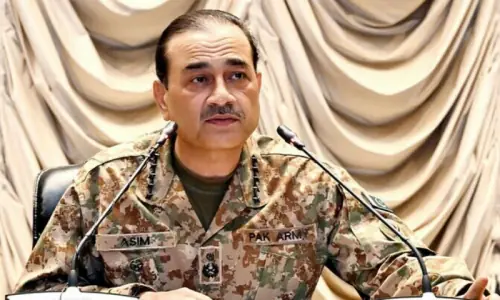ISLAMABAD: The army is finalising plans to launch the final phase of Operation Zarb-i-Azb in mid-July to flush out Taliban terrorists from their remaining strongholds along the border with Afghanistan.
“Preliminary preparations for the final push have started, which will begin next month,” a senior military official told Dawn during a background briefing on the eve of the first anniversary of the commencement of Zarb-i-Azb.
The final drive will be in south of Dattakhel towards the border through the forested and mountainous Shawal Valley.
A large number of militants fleeing the operation in other parts of North Waziristan are believed to have taken refuge in Shawal Valley, which is considered to be an Al Qaeda sanctuary and a stronghold of Gul Bahadur, a warlord once considered pro-government.
Shawal has also been the focus of US drone attacks this year with seven of the nine strikes hitting targets in the valley in which at least 43 suspected militants were killed.
“Operation ZeA moves to last few pockets close to Pak-Afghan border,” military spokesman Maj Gen Asim Bajwa, meanwhile, said in a twitter posting.
At the same time, in Khyber Agency, which the army claims has been mostly cleared through Operations Khyber I and II, troops would be clearing “a remaining small pocket,” abutting on Orakzai Agency, besides “consolidating their earlier gains”.
Over 2,700 killed in a year; intelligence-based action in cities likely
The army says it has eliminated 2,763 terrorists during the operation launched last year. There has, however, been no explanation as to how this precise figure about militant casualties has been collected because a large number of them are said to have been killed in strikes by Pakistan Air Force jets.
Another 218 terrorist have reportedly been killed in the intelligence-based operations (IBOs) conducted in other parts of the country to prevent the feared backlash of Zarb-i-Azb. The IBOs are flaunted by the military as a major success story.
But, this has come at the cost of 347 troops and displacement of over a million people.
Rustam Shah Mohmand, who remained part of the government committee that held talks with the Taliban before the start of the operation, said the cost of achieving the “objectives” was too high and there was “disproportionate use of force”.
“Wasn’t there any alternative,” he questions as he looks back at the events over the past 12 months.
Gen Bajwa said in his statement that significant achievements had been made in North Waziristan and Khyber Agencies and “strongholds, communication infrastructure, and sanctuaries” of militants had been “largely cleared”.
But, military officials in private conversations have been more realistic about the impact of Operations Zarb-e-Azb and Khyber as they say the ability of the banned Tehreek-i-Taliban Pakistan (TTP) to plan and execute attacks from North Waziristan and Khyber had been “reduced”. They say that a bigger threat was now coming from the urban-based groups linked to the TTP.
The senior military official, who gave the background briefing, said: “It is high time that urban centres are focused and the scope of IBOs is expanded.”
Security analyst Amir Rana believes that while the TTP had been damaged, the security threat persists primarily because of the emergence of the Daesh factor, Al Qaeda in the Indian Sub-continent and the emergence of sleeper cells in urban areas.
Analysts say a lot will depend on how successfully the law-enforcement agencies consolidate their gains against terrorism and keep the pressure on the militant groups.
Published in Dawn, June 14th, 2015
On a mobile phone? Get the Dawn Mobile App: Apple Store | Google Play


































